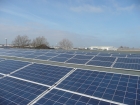EEF funding supports effective energy saving

With support from the Energy Efficiency Financing Scheme Kensington Windows & Doors in Derby has installed a wood-burning space heater in its workshop and solarPV panels on the factory roof. The £10 000 cost of the space heater is expected to be paid back in 30 months, and the £100 000 cost of the solar panels within eight years.
An assessment by the Carbon Trust of the wood-burning space heater confirmed that initial estimates for energy savings were entirely realistic and that they would produce a small surplus over repayments to make the equipment upgrade cash positive from day one. Gas was the previous fuel, and heating costs of £1000 a month have been halved.
Similarly, the Carbon Trust estimated that the solarPV panels supplied and installed by Pro Heat would save £7500 a year, reportedly half of the previous electricity costs.
Paul Rodgers, owner of Kensington Windows & Doors, said, ‘Before the solar panels were installed, electricity bills were approximately £1200 a month. Since the installation, I have been steadily monitoring their performance and have already been extremely impressed with their energy output and the energy savings the system has delivered.’
The EEF scheme is designed to provide finance for energy-efficient equipment for businesses where energy-cost savings can make a project cash positive.







